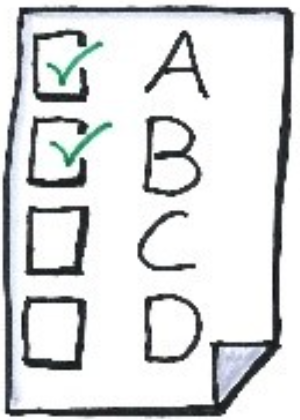.png) | Ingenuity + Integrity + IntelligenceCompetence through Credentials |
test & Assessment Certificate
WORKSHOP DESCRIPTIONS

Workshop Descriptions
Individual workshops cost between $59 and $89.
Save by signing up for the series (all six workshops). Additional discounts are available for groups, Professional Members and Organizational Members. Email Judy@HaleCenter.org for more details about these discounts.
Interested in an on-site workshop?
Email Judy@halecenter.org to make arrangements.
Certificate-Series: How to Develop Tests & Assessments |
The series is in six short webinars (workshops) that range from 60 to 90 minutes plus time for Q & A. Participants will receive a digital workbook for each session plus a Quick Start Quality Control Guide with job-aids. The cost for the whole series is $414, a $30 savings. The cost for ISPI members is $384 and the cost for Hale Center Professional Members is $354 Workshop 1: Testing Basics You will be able to explain to others:
Workshop 2: What to Test and How You will be able to:
Workshop 3: How to Develop Multiple-Choice Questions that Measure Higher Level Skills You will be able to:
Workshop 4: How to do an Item Analysis You will be able to:
Workshop 5: How to Build Effective Performance Tests You will be able to:
Workshop 6: How to Build Effective Checklists and Rubrics for Scoring Performance Items You will be able to:
|
Certificate-Series: How to Get Valid Data |
The series is in six short webinars (workshops) that range from 60 to 90 minutes plus time for Q & A. Participants will receive a digital workbook containing the presentation, job aids, and reference materials. You will be able to design and conduct the data gathering method and analyze the results. The cost for the whole series is $404, a $30 savings. The cost for ISPI members is $374 and the cost for Hale Center Professional members is $344. Workshop 1: How to Conduct Observational & Cognitive Interviews and Interpret the Results
Workshop 2: How to Conduct Critical Incident Interviews and Interpret the Results
Workshop 3: How to Conduct a Nominal Group and Interpret the Results
Workshop 4: How to Conduct a Sociogram and Interpret the Results
Workshop 5: How to Conduct a Flanders Interaction Analysis and Interpret the Results Workshop 4: How to Develop Effective Surveys and Interpret the Results
|
Certificate-Series: Practical Psychometrics & Analytics |
The series is in six short webinars (workshops) that range from 60 to 90 minutes plus time for Q & A. Participants will receive a digital workbook for each session containing copies of the presentation, job aids, and resources. The cost for the whole series is $414, a $30 savings. The cost for ISPI members is $384 and the cost for Hale Center Professional members is $354. Workshop 1: Psychometric Basics
Workshop 2: How to Control the Four Sources of Bias (Sampling, Construct, Content, and Administrative)
Workshop 3: Guidelines for Standard Setting and Establishing a Pass Scores
Workshop 4 How to Do Item Analyses and Determine the Equivalency of Test Forms
Workshop 5: Methods for Analyzing Quantitative Data using Excel and the Questions they Answer (Standard Deviation, ANOVA, Correlations, Two-Tailed t-tests, Chi Square Goodness of Fit, T and Z Scores) Workshop 6: How to Analyze Qualitative Data
|
Click here to register for an upcoming Workshop. Save by signing up for the series (all six workshops). Additional discounts are available for groups, Professional Members and Organizational Members. |
Call or Email Us! |